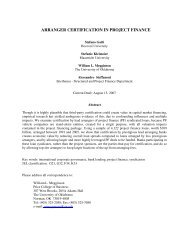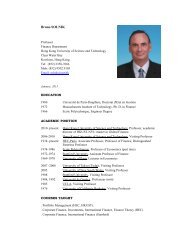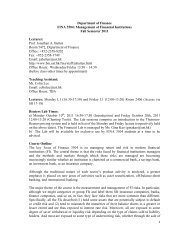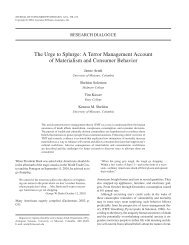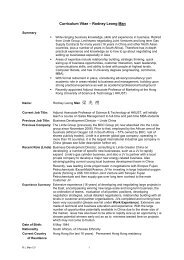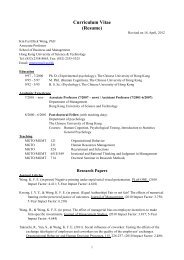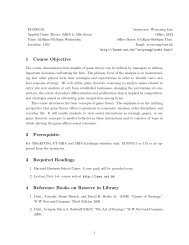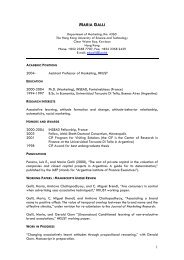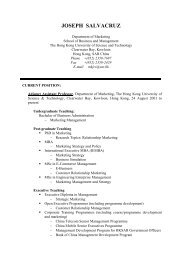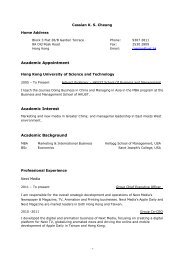ISOM 2700 Syllabus - HKUST Business School
ISOM 2700 Syllabus - HKUST Business School
ISOM 2700 Syllabus - HKUST Business School
You also want an ePaper? Increase the reach of your titles
YUMPU automatically turns print PDFs into web optimized ePapers that Google loves.
Course Description<br />
<strong>ISOM</strong> <strong>2700</strong> OPERATIONS MANAGEMENT<br />
Spring 2012<br />
Department of Information Systems, <strong>Business</strong> Statistics &<br />
Operations Management<br />
Operations Management studies the critical business processes by which inputs of materials,<br />
labor, capital and information are transformed into products and services which customers<br />
want and are willing to pay for. This course will provide you with the concepts and tools<br />
needed to understand and articulate the impact of an organization’s business processes, and<br />
the ability to analyze and continuously improve these business processes to make things work<br />
better, faster and cheaper.<br />
Learning Goals<br />
This course is designed in such a way that, after completing it, you will be able to 1<br />
1. Describe the design and delivery of product/service in different organizations and<br />
evaluate the systems for measurement and improvement of operations. [1,4]<br />
2. Identify and select crucial variables and measurements in decision modeling. [1]<br />
3. Identify and describe operations management as one of the core business functions. [3]<br />
4. Integrate operations management with other business functions to support a coherent<br />
corporate strategy. [3]<br />
5. Determine how operation management decisions impact other business functions. [3]<br />
6. Identify a wide range of contemporary and pervasive business issues, as well as<br />
technology advancement that impact the management of operations. [4]<br />
7. Apply a range of appropriate quantitative and qualitative methods and tools to solve<br />
business problems in which the management of operations is a critical issue. [4,7]<br />
8. Discuss the role of operations management in sustainability and social responsibility. [8]<br />
Class Schedule<br />
Teaching Staff<br />
<strong>ISOM</strong><strong>2700</strong> L1: Tue and Thu 9:00 – 10:20 at Room 3007<br />
<strong>ISOM</strong><strong>2700</strong> L4: Tue and Thu 10:30 – 11:50 at Room 3007<br />
Instructor: Man Yu (manyu@ust.hk)<br />
Office: Room 4426 (Lift 17-18)<br />
Phone: 2358-7728<br />
Office hours: Tuesday 15:30 – 17:30 pm or by appointment<br />
Teaching Assistant: Elvis Lee (imelvis@ust.hk)<br />
Office: Room 4351 (Lift 13-15)<br />
Phone: 2358-8543<br />
Office hours: Monday 14:30 – 16:30 pm or by appointment<br />
1 The numbers at the end of each learning goal refer to the goals in the Program Intended Learning Objectives<br />
for the OM BBA Program (http://ihome.ust.hk/~bbaom/program/PILO_BBAOM%20_Aug26_.pdf).<br />
1
<strong>ISOM</strong> <strong>2700</strong> <strong>Syllabus</strong> Spring 2012<br />
Course Materials<br />
1) Two recommended textbooks:<br />
Jacobs and Chase, “Operations and Supply Management”, McGraw-Hill, 2009.<br />
Slack et.al, “Operations and Process Management”, Prentice Hall, 2009.<br />
Note: It is not required to buy the textbooks, but it is good to have at least one of the two<br />
books for study reference.<br />
2) Notes and reading materials from course website at LMES (http://lmes2.ust.hk).<br />
Performance Evaluation<br />
Quiz 1 – Feb 28 (Tuesday) 20%<br />
Quiz 2 – April 10 (Tuesday) 20%<br />
Cumulative Final Exam 50%<br />
Class Participation 10%<br />
(1) Both quizzes last for 80 minutes and take place 7:00 – 8:20pm on the quiz date.<br />
(2) The final exam lasts for 3 hours and takes place on the university assigned exam date.<br />
(3) The quizzes and the final exam are closed book. One A4 size note sheet (2-sided) is<br />
allowed for each quiz; Two A4 size note sheets (2-sided) is allowed for the final exam.<br />
All note sheets must be handed in together with the quizzes and the final exam.<br />
(4) Each quiz only tests materials that have not been tested in the other quiz.<br />
(5) The final exam covers all materials in this course.<br />
(6) Class participation is evaluated based on in-class exercises randomly distributed over the<br />
semester. A total of six to eight in-class exercises will be assigned. For each student, the<br />
five highest scores will be counted, each carrying 2% of the final grade.<br />
Important Policies<br />
1) All mobile phones and ringing devices should be turned off or silent in class.<br />
2) Students who miss any of the exams will not be given “make-up” exams.<br />
3) If you miss a quiz due to emergency, the weight of the quiz will be added to the final<br />
exam only if convincing evidence is presented. Otherwise, a zero score will be given.<br />
4) If you miss the final exam, the score for the final exam will be zero in any case.<br />
Academic Honor Code<br />
Personal integrity and professionalism are fundamental values of the university community.<br />
To help ensure that these values are upheld and to maintain equitability in the evaluation of<br />
your work, this course will be conducted in strict conformity with <strong>HKUST</strong> Academic Honor<br />
Code (see http://www.ust.hk/vpaao/integrity/). Anyone caught cheating or plagiarizing will fail<br />
the course and there will be no acceptable excuses.<br />
2
<strong>ISOM</strong> <strong>2700</strong> <strong>Syllabus</strong> Spring 2012<br />
Module 0: Introduction and Overview<br />
Course Outline<br />
Feb 2 Introduction<br />
Definition and strategic framework of Operations Management<br />
Course structure and expectation<br />
Module I: Performance Evaluation<br />
Feb 7&9 Process Analysis<br />
Terminology and tools used to describe, analyze, and evaluate processes<br />
Process improvement and redesign<br />
Feb 14&16 Quality Management<br />
Concepts of TQM, quality control, and six-sigma<br />
Acceptance sampling plan and process control charts<br />
Module II: Strategic Design<br />
Feb 21&23 Capacity Planning<br />
Capacity planning concepts<br />
Decision tree method<br />
Feb 28 Quiz 1 7:00 – 8:20pm<br />
Mar 1 Supply Chain Strategies<br />
Bullwhip effects and counteracts<br />
Match products with supply chains<br />
Mar 6 Process & Layout Design<br />
Process types and product-process matrix<br />
Layout formats and assembly line balancing<br />
Mar 8 Service Design<br />
Service types and properties<br />
Service positioning and design<br />
Module III: Tactical Management<br />
Mar 13&15 Project Management<br />
Concepts of project management and CPM<br />
Time-cost tradeoff problems<br />
Mar 20&22 Response Time Management<br />
Effects of variability and utilization<br />
Queuing models<br />
Mar 27&29 Resource Management<br />
Linear programming: graphical methods and Microsoft Excel<br />
Sensitivity analysis<br />
3
<strong>ISOM</strong> <strong>2700</strong> <strong>Syllabus</strong> Spring 2012<br />
Apr 10 Quiz 2 7:00 – 8:20pm<br />
Apr 12&17 Inventory Management<br />
ABC classification, EOQ<br />
Fixed-order quantity and fixed-time period models<br />
Apr 19&24 Revenue Management<br />
Newsvendor model<br />
Applications: price differentiation, overbooking, buyback contract<br />
Apr 26&May 3 Forecasting<br />
Qualitative and quantitative forecasting techniques<br />
Time series analysis<br />
Linear regression<br />
Module IV: A Comprehensive View<br />
May 8 Lean & Green Operations<br />
Lean manufacturing concepts and practices<br />
Role of OM in social responsibility and sustainability<br />
May 10 Course Review<br />
Note: The instructor reserves the right to modify the course outline during the term<br />
when needed.<br />
4
<strong>ISOM</strong> <strong>2700</strong> <strong>Syllabus</strong> Spring 2012<br />
Topics with Book References<br />
Lecture<br />
No.<br />
Topic<br />
Book References (page range)<br />
Jacob & Chase (the<br />
Core, 1 st Jacob & Chase (the<br />
Edition) Core, 2 nd Slack et al.<br />
Edition)<br />
1 Introduction and Overview 4 – 17 25 – 31 48 – 49, 53 – 56<br />
2-3 Process Analysis 69 – 71 140 -146, 154 – 156 *<br />
4-5 Quality Management 136 – 168 132 – 166 392 – 403, 412- 421, 443<br />
6-7 Capacity Planning 53 – 70 44 – 56 248 – 268 #<br />
8 Supply Chain Strategies 182 – 197 222 – 234<br />
212-213, 218-219, 226, 232 –<br />
235<br />
9 Process & Layout Design 80 – 83, 85 – 93 72–73, 75– 81, 110 – 116, 118 – 119<br />
10 Service Design 108 – 111 100 – 105 479<br />
11-12 Project Management 22 – 40 179 – 203 498 – 515<br />
13-14 Response Time Management 111 – 127 106 – 122 170 – 177<br />
15-16 Resource Management 202 – 213, 380 – 399 250 – 260, 462 – 470 230 – 231<br />
17-18 Inventory Management 312 – 314, 318 – 336<br />
389 – 391, 396 – 408,<br />
410 – 414<br />
280 –291, 294 – 301<br />
19-20 Revenue Management 298 – 299, 315 – 318 372 – 374, 393 – 396 264, 292 – 293<br />
21-22 Forecasting 248 - 272<br />
307 – 314, 320 – 331,<br />
333 – 335<br />
96 – 104<br />
23 Lean & Green Operations 223 - 241 271 – 275, 280 – 288 350 - 367<br />
* Some of the concepts may be defined differently in the book. Always follow the<br />
definitions in the lecture notes.<br />
# Supplementary readings<br />
5




